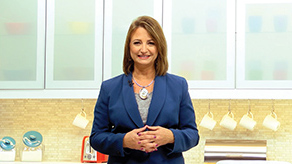Recently, I worked with a jewelry designer and her husband who own a small jewelry company in order to purchase a true “forever home” for their business. They had been leasing a commercial retail space for the last 30 years. They told me they had always known the benefits of buying a space versus renting but had been too afraid of the process, which was completely unknown to them, to ever do so. When we finally did the math and they realized their monthly payments would literally be half the price of their monthly lease payments, they could not wait any longer.
As a Texas real estate broker, one of the things I do at my company, Goodwin Commercial, is educate our clients on the commercial investment process. We offer a step-by-step process evaluation to protect our clients when making the decision to go from leasing to purchasing a property for their business. That process often includes making recommendations about how they might leverage a good situation or opportunity into a great one, often via strategic financing and purchasing decisions. In this case, the couple initially tried to go the SBA (U.S. Small Business Administration) route but were turned down by the first national bank they approached. They were definitely discouraged!
Note: The couple’s tax returns did not meet SBA loan standards because their business did not show a profit. This was no fault of the SBA, but rather the result of past filing decisions. The SBA offers incredible opportunities to small businesses (see sidebar on opposite page) but many small-business owners do not realize that if they do not qualify for an SBA loan, they have other options.
We opted to approach a small bank with which I have a relationship already that does creative deals for commercial loans, including looking for a lot of different resources to help borrowers get the deal done. That bank was successful in finding an option for the couple. They will soon have their own space and, even better, are renting out part of that space to other jewelry professionals. It is a win-win situation that will help the new owners begin building equity for themselves. It truly is a happy ending for everyone, although I expect it is just the beginning for these two as commercial investors.
3 Valuable Lessons Learned
This “investor story” demonstrates several valuable lessons that apply specifically to commercial real estate investing and also more generally to real estate investing:
Lesson #1: Find a way.
My motto is “Never give up,” but you have to apply that to your investing the right way. You can’t just keep battering away at a problem without being creative and resourceful. The whole concept should really be this:
Never give up and find a way.
Too many times, investors give up too easily because they find investing intimidating (for example, if this couple had walked away from the idea of owning a commercial space after being turned down the first time). Other times, they doggedly pursue their goals by repeating the same process over and over even though their strategy is not working. We had to first try, then fail, then reevaluate and take a different tack in order to get our desired results.
Lesson #2: Never assume. Instead, do your math.
So many investors tell me they “could never” invest in commercial real estate, buy a commercial space, or take whatever the next step is for them in real estate investing because it is just too hard, too overwhelming, or too complicated. One of the biggest losses many business owners take is the lost revenues and net income that could have been theirs if they had been willing to at least consider owning their space instead of leasing it. In the case of the jewelry store owners, their debt price, the price they are paying on the building loan, is half of what their monthly rent was on their previous space and the square footage is nearly identical.
Lesson #3: Ownership is not the end.
Owning their own retail space would have been great for my investors, but the real fruits of ownership came when they opted to lease out some of that space and essentially pay their monthly debt using the resulting income. Never be afraid of looking for the “next level” when it comes to your real estate investing. Investors sometimes avoid this part because they assume that leveling up will cost more money. In some cases, however, taking the next step can actually free up more capital or resources for other things!
Bonus Lession: Build positive relationships at all times.
Every real estate investor knows their network is important, but you really have to deliberately build your relationships over time in order to fully leverage them for great results. My relationship with the lender in this scenario helped us get a good loan on a good deal because they knew that putting in the effort to try to help make the process work would be a good investment because I would not ask them to try otherwise.
Equally importantly, I knew they would do their best and, if they had been unable to find a vehicle that would work on the deal, I would have known it was not because they failed to take my clients seriously.
SBA Loan Basics: SBA stands for Small Business Administration. The SBA is a federal entity that works with lenders to provide loans to small businesses. Although the SBA does not lend money directly to small business owners itself, it sets guidelines for loans that other institutions can make to certain types of businesses in order to reduce risk for the lenders while increasing small businesses’ access to capital. Some of these loans even come with continued support to help business owners start and run their businesses, and SBA loans may have:
- Lower down payments
- Flexible overhead requirements
- Limited or even no collateral requirements
























0 Comments